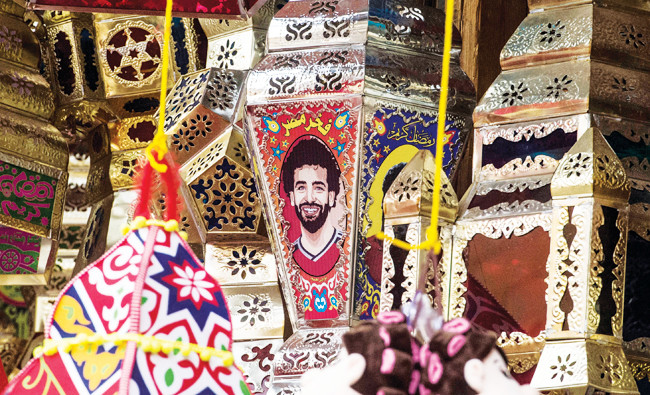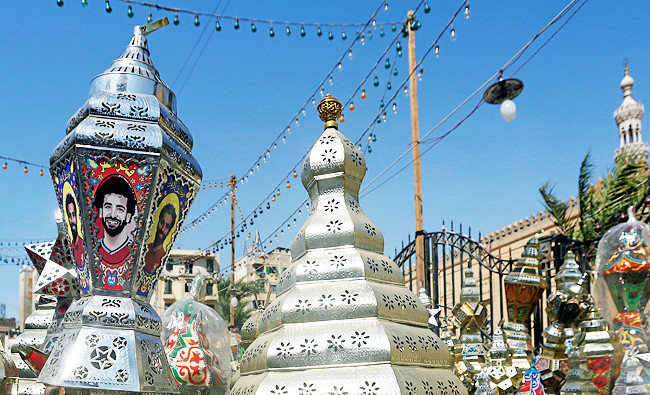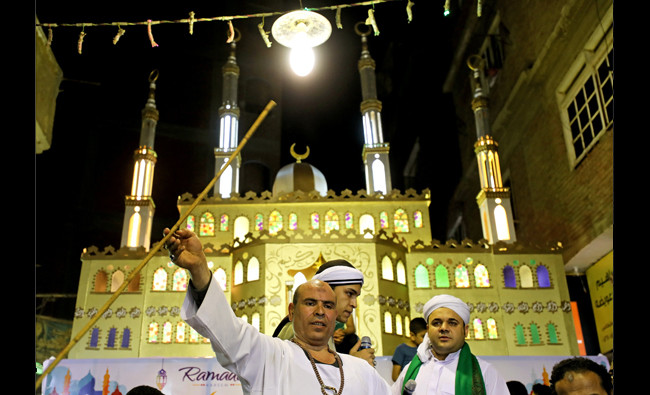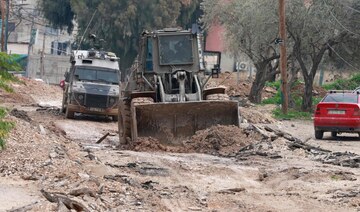CAIRO: They call him the Egyptian king. The king on the wing. Mohamed Salah, the gift from Allah. And that is just in the English city of Liverpool, where he plies his trade as a footballer of exceptional talent. Here in his homeland, he transcends the sport that has made him famous.
In Cairo this Ramadan his face is everywhere, adorning everything from lanterns to bedlinen. Egypt has a tradition of naming dates — traditionally eaten to break the fast — after celebrities. Unsurprisingly, the Mohamed Salah date is by far the top seller.
Meanwhile, in March it was reported that there was strong support for him in the presidential elections — and he was not even a candidate.
The ordinarily packed streets will be deserted during Saturday’s Champion’s League final between Liverpool and the mighty Real Madrid. It is the same story whenever there is a Liverpool match on: The streets go quiet and the cafes fill up. Cairo’s leading clubs, Al-Ahly and Zamalek, now have to play second fiddle to a club thousands of miles away on another continent. 
“I make more money when Liverpool are playing than on any other day,” Hamdi El-Wahsh told Arab News. He owns a cafe in the Maadi district of Cairo and on the day of the Egypt Cup game featuring Zamalek, he had to warn customers that if the match went into extra time they would have to miss it because he was switching over for the pivotal Champions League semifinal between Liverpool and Roma.
“They did not mind. On the contrary, they seemed more excited to watch Liverpool because of Salah,” said El-Wahsh. “Nobody is really interested in a domestic match. They mainly come for Salah.”
Football achievements
At just 25, and after only one season with the English club, Salah’s footballing achievements are remarkable. He was the top scorer in the Premier League and was named Player of the Year by his peers in the Professional Footballers Association. He was also African Footballer of the Year in 2017, and it was his last-minute goal against Congo that secured Egypt a place in next month’s World Cup for the first time since 1990.
But Salah’s impact on his country reaches far beyond the football field, and he is loved for much more than what he does with a ball at his feet.
As a 14-year-old growing up in Nagrig, a village of 15,000 people in the Nile Delta, getting to training sessions with his first senior team, El Mokawloon, meant a four-hour journey each way by bike, several buses and on foot. Nowadays he drives a Porsche Turbo and a Mercedes GLE, and with a weekly salary of £90,000 will never again have financial worries, but he is not keeping his wealth for himself.
He has donated a dialysis machine to a hospital in Nagrig, paid for land to build a sewage treatment plant and renovated a public sports center, a school and a mosque. An empty car park is set to be the site of an ambulance station. The Mohamed Salah Charity dispenses financial support to families in need.
“He is constantly donating money to charities and to his home town,” said Said Elshishiny, Salah’s childhood football coach. “It’s enough to make anyone adore him.”
When the head of Zamalek, who decided not to sign Salah to the club, tried to give him a gift — variously reported as a humvee or a luxury villa — the footballer declined and suggested that he buy medical equipment instead. 
He is a committed and effective anti-drugs campaigner. A video he took part in last month, promoting the message “You are stronger than surrender, you are stronger then drugs” produced 35 million interactions on social media. Within three days of its release, Egypt’s Ministry of Social Security reported a fourfold increase in the number of people seeking treatment for addiction.
Gold mine
In commercial terms, the man is a gold mine. His face is on video stores and shopping centers. One mural outside a downtown Cairo cafe has become a tourist attraction.
This Ramadan, shoppers have flocked to buy a fanous — a traditional Ramadan lantern — in the form of a moving, singing Mohamed Salah wearing the Egyptian national team strip, costing between 180 and 250 Egyptian pounds ($10 to $14).
“It’s the best-selling item I have now,” said Ramadan Salah, who owns a small shop in downtown Cairo. People come to my shop and specifically ask for it. One customer told me he was buying a Salah lantern as a birthday gift for his eight-year-old son who is a big fan.”
Demand has been so high that Egyptian traders have had to import Chinese-made lanterns. Salah lanterns have even made it on to the official World Cup Twitter feed with the caption: “Which toy do the kids of Cairo want? Woody, Hello Kitty, a surfing @mosalah? I think we all know the answer.”
Furnishings bearing the footballer’s image are premium items. Al Sayed Najida, a furniture trader in Ghouriya, admits he charges more but says that is because he uses superior materials for his Salah-themed wares. “We sell at a price that fits the cost of the raw material. He is a global player and God loves him as he loves us,” he said.





























